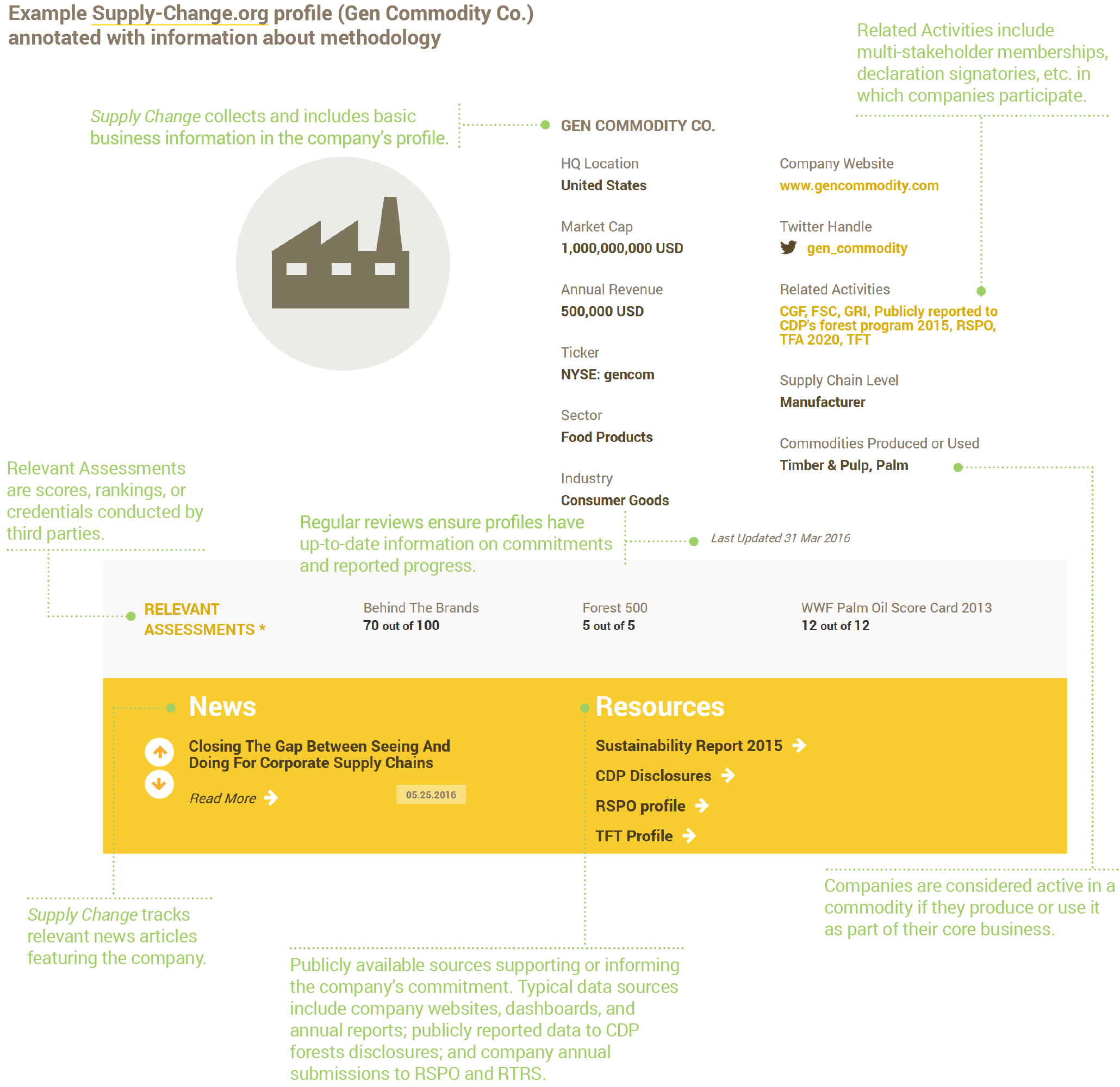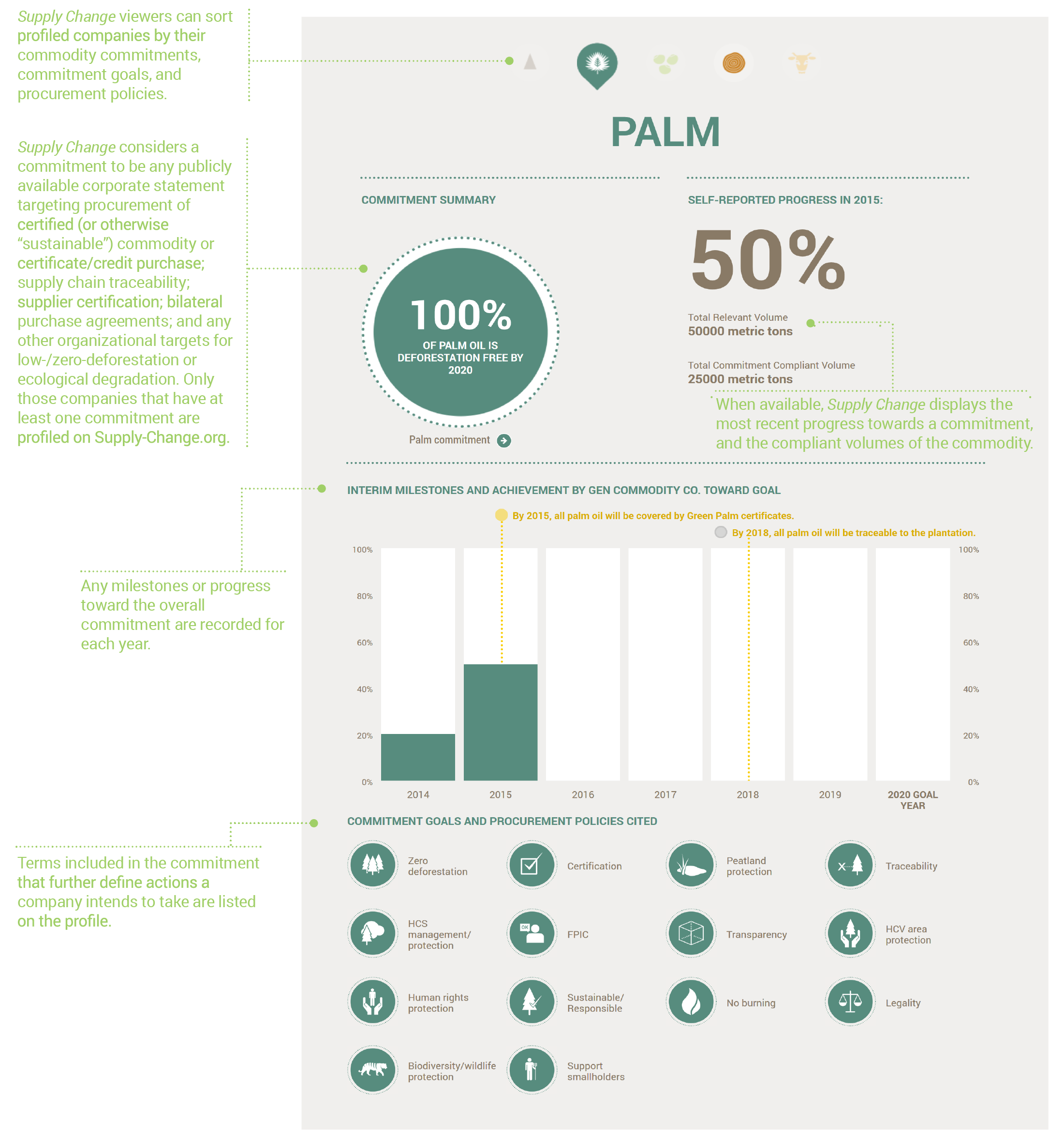Supply Change is the world’s first and only freely available data aggregation and profiling platform that tracks global corporate public commitments to and progress toward eliminating deforestation from the four most damaging global commodity supply chains: palm, soy, timber & pulp, and cattle.
Included in these supply chains are thousands of distinct actors, including companies, financial institutions, and governments. In different ways, each of these actors has a responsibility for the deforestation and land degradation resulting from their actions. Producers are responsible to use best practices that avoid deforestation and manufacturers are dependent on those producers to meet demanding sourcing guidelines. Currently, Supply Change focuses on companies that both participate in activities related to commodity-related deforestation risk or that are included in other relevant assessments. The related activities and relevant assessments currently monitored are listed at the bottom of this page.
The graphic below provides a summary of the methodology used to develop profiles on this site and describes where information for a company is displayed.
The full methodology text is available here.
The information captured through this project is limited to what companies publicly disclose. We encourage stakeholders, including profiled companies themselves, to advise us of any missing or discrepant data. We will update, correct, and supplement our initial data set year-round, but encourage new, full, and public disclosure through CDP (www.cdp.net/en-US/Programmes/Pages/forests.aspx).
This field is changing rapidly - we encourage readers to frequent Supply-Change.Org for the most up-to-date news, data, and analytics on commitments to sustainable commodities.
We also invite feedback, corrections, clarifications, and ideas - contact us at info@supply-change.org.
Commitment Goals and Procurement Policies Defined
Tracked Commitment Goals and Procurement Policies based on frequency of citation in commitment texts.
Zero Deforestation Zero Deforestation - Commits to “zero deforestation,” “no deforestation,” “deforestation-free” or similar language that implies “no deforestation anywhere,” whether defined or not. See Brown and Zarin, What Does Zero Deforestation Mean? in Science, November 2013 for a longer discussion of these terms and their implications.
Zero Net Deforestation Zero NET Deforestation - Commits to Zero Net Deforestation, the approach advocated by WWF and endorsed by the CGF, which “acknowledges that some forest loss could be offset by forest restoration”, such as through the purchase of REDD+, biodiversity offsets, or mitigation banking credits. See Brown and Zarin, What Does Zero Deforestation Mean? in Science, November 2013 for a longer discussion of these terms and their implications.
Zero Gross Deforestation" height="180 Zero GROSS Deforestation This term very specifically commits to no loss of forest area over time caused by conversion to nonforest, as measured using remote sensing. See Brown and Zarin, What Does Zero Deforestation Mean? in Science, November 2013 for a longer discussion of these terms and their implications.
Zero Gross Deforestation" height="180 High Conservation Value (HCV) - Commits to follow the High Conservation Value (HCV) approach, a formal approach to identify habitats (such as within logging or agriculture concessions) that provide considerable values to human and natural ecosystems and seek to maintain or enhance them. See www.hcvnetwork.org for more information.
Zero Deforestation High Carbon Stock (HCS) - Commits to the High Carbon Stock (HCS) approach, which limits what lands can be converted to agriculture based on their carbon storage. There are two groups developing their own definitions and thresholds for High Carbon Stock. One group, called the HCS Approach group, includes civil society (Greenpeace and The Forest Trust). It defined “high carbon stock” as 35 tons of carbon per hectare in a pilot project in Kalimantan, Indonesia. The other group, known as the Sustainable Palm Oil Manifesto group, is industry-only, and is currently conducting a separate study to define high carbon stock. See Greenpeace’s briefing and www.carbonstockstudy.com for more information.
Zero Deforestation Peat protection - Commits to peat land protection in any form, whether no development on peat at all, ever, or limiting development of peatland to peat of shallower depths or with particular soil composition characteristics.
Zero Deforestation No burning - Commits to no burning or use of fire as a means of clearing land for agriculture.
Zero Deforestation Traceability - Commits to traceability in their supply chain (specifically using this term).
Zero Deforestation Transparency - Commits to transparency in progress reporting (whether specifically using this term or mentioning that they will report publicly on progress in any manner in any time frame).
Zero Deforestation Legality - Commits to follow all local and/or national laws.
Zero Deforestation Free, Prior, and Informed Consent (FPIC) - Commits to the practice of recognizing the right of indigenous and traditional communities to give or withhold consent to actions that will affect them, especially actions affecting their lands, territories and natural resources. FPIC is intended to prevent intentional or unintentional negative impacts of large-scale land use or development projects on these communities as a result of their exclusion from decision-making processes. FPIC is considered a “best practice” in conservation and development to identity, avoid or negotiate potential conflicts with communities.
Zero Deforestation Human Rights - Commits to some additional social criteria in addition to environmental criteria, whether agreeing to consult with local communities or to meet or exceed basic human rights (either specifically stating that they will meet United Nations Declaration of Human Rights, United National International Labor Organization conventions, or generally stating that they will provide safe working conditions, fair labor practices, housing, and/or training to workers).
Zero Deforestation Certification - Commits to buying any amount of commodity certified by an independent third party, whether the standard is specified or unspecified. In certain cases, includes commitment to create proprietary internal certification systems.
Zero Deforestation Reduce use - Commits to reduce use of the commodity.
Sustainable/ Responsible Sustainable/Responsible - Commits to producing/buying "sustainable," "sustainably-sourced," "responsible," "responsibly-sourced," or similar language, whether defined or not.
Zero Deforestation Biodiversity/wildlife protection - This policy captures a company’s commitment to uphold the biodiversity of its lands or the lands of its suppliers.
Zero Deforestation Support smallholders - Smallholders are responsible for a sizeable share of production of the big four commodities as well as the associated forest conversion. Some companies help suppliers with sustainable production, audits, workshops and trainings, group certification, and technical support.
Zero Deforestation Reduce GHG emissions from operations - GHG emissions from producer operations contribute to a company’s carbon inventory. Policies focus on quantifying and mitigating GHG emissions from land use change, such as draining peatlands and cutting down forests for production. Supply Change only tracks GHG policies that cover production in forest landscapes. Therefore, policies for other levels of the supply chain (i.e., the GHG emissions of manufacturing facilities) are not included.
Zero Deforestation Improve water management - Improved water management can take a variety of forms, such as protecting watersheds, prohibiting peatland drainage, minimizing discharge of pollutants into waterways, or reducing irrigation inputs. Supply Change only tracks water policies that cover production in forest landscapes. Therefore, policies for other levels of the supply chain are not included.
Zero Deforestation Improve waste management - Similar to pesticides, some agricultural producers recognize that the large amounts of waste associated with commodity production also pose risks like polluting local waterways, harming biodiversity, and contributing to inefficient resource use. Supply Change only tracks waste policies that cover production in forest landscapes. Therefore, policies for other levels of the supply chain are not included.
Zero Deforestation Improve soil management - Farmers and their buyers recognize that maintaining healthy soils is vital for sustaining long-term production for each of the big four commodities.
Zero Deforestation Improve fertilizer management - When used effectively, fertilizers can improve yields (sometimes short-term) of soy, palm, and timber. However, inexpert or excessive use can result in polluted waterways.
Zero Deforestation Reduce pesticides or toxins - Many upstream and downstream companies recognize that pesticides, herbicides, and chemicals (such as the herbicide paraquat) used in commodity production can pose serious risks to farm workers, local communities, and surrounding ecosystems. Consequently, many limit or outright ban their use. Supply Change only tracks these policies that cover production in forest landscapes. Therefore, policies for other levels of the supply chain are not included.
Zero Deforestation Respect animal welfare - Many companies experience public pressure both to ensure the ethical treatment of their cattle and the elimination of deforestation from the expansion of grazing lands.
Zero Deforestation Improve yields - Given growing demand for the big four commodities, many regard improving yields per hectare as a vital way of increasing production without increasing agricultural expansion into forests.
Zero Deforestation Other - Commits to additional criteria that may be a unique aspect of a particular commodity or not in common usage.
Relevant Assessments Tracked
Within each profile the following relevant assessments were tracked. Relevant assessments are those scores, rankings, or credentials conducted by third-parties. Supply Change will consider including other relevant assessments as they are brought to our attention.
- Behind the Brands 2016
- CDP's forests program sector leader 2015
- CLUA's Global Commodity Business report
- Forest 500
- Green Tigers Report 2015
- Greenpeace Cutting Deforestation Palm Score 2016
- Leather Working Group Rating
- Rainforest Action Network (RAN) Snack Food 20 Scorecard
- Union of Concerned Scientists Beef Scorecard 2016
- Union of Concerned Scientists Palm Oil Scorecard 2015
- WWF Palm oil Score Card 2016
- WWF Soy Report Card 2016
- ZSL Sustainable Palm Oil Transparency Toolkit (SPOTT)
Related Activities Tracked
Within each profile the following related activities were tracked. Related activities include multi-stakeholder memberships, declaration signatories, etc. in which entities are involved. Supply Change will consider including other related activities as they are brought to our attention.
- Brazilian Roundtable on Sustainable Livestock (GTPS)
- Brazilian Vegetable Oil Industry Association (ABIOVE)
- British Retailing Consortium (BRC)
- CanopyStyle Pledge
- Consumer Goods Forum
- Danube Soy
- Forest Stewardship Council (FSC)
- Global Agri Business Alliance
- Global Forest & Trade Network (GFTN)
- Global Reporting Initiative (GRI)
- Global Roundtable for Sustainable Beef (GRSB)
- High Carbon Stock (HCS) Approach Group
- Leather Working Group (LWG)
- New York Declaration on Forests (NYDF)
- Palm Oil Innovations Group (POIG) Charter
- Programme for the Endorsement of Forest Certification (PEFC) International (Stakeholder Members)
- Report to CDP Forests
- Round Table on Responsible Soy (RTRS)
- Roundtable on Sustainable Biomaterials (RSB)
- Roundtable on Sustainable Palm Oil (RSPO)
- Sustainable Agriculture Initiative (SAI) Platform
- Sustainable Apparel Coalition (SAC)
- Sustainable Biomass Partnership (SBP)
- Sustainable Palm Oil Manifesto
- Sustainable Purchasing Leadership Council (SPLC)
- Sustainable Trade Initiative (IDH)
- TFT
- The Sustainability Consortium (TSC)
- Tropical Forest Alliance (TFA) 2020
- Union for Ethical BioTrade (UEBT)
- We Mean Business
- World Business Council for Sustainable Development (WBCSD)
- WWF (UK) Forest Campaign


